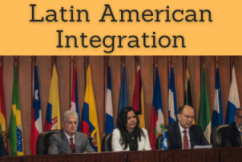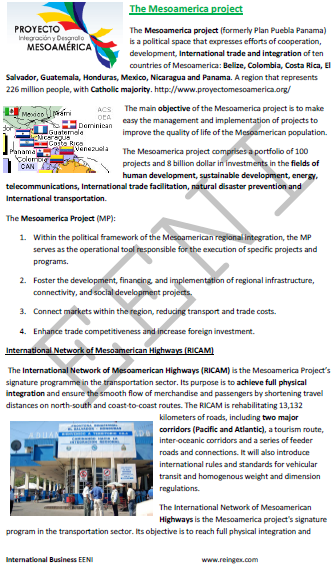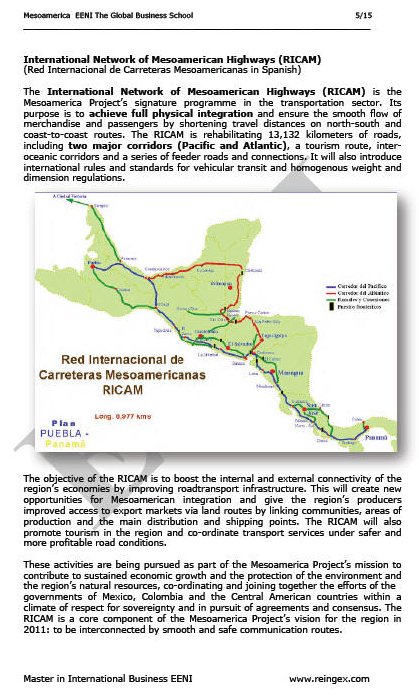Mesoamerica Project, Puebla Panama Plan
Mesoamerican Market: Mexico, Belize, Colombia, Costa Rica, Guatemala

The Mesoamerica Project (formerly Puebla-Panama Plan) is a political and economic space that expresses the efforts of cooperation, development, regional trade, and integration of ten Mesoamerican countries: Belize, Colombia, Costa Rica, Dominican Republic, El Salvador, Guatemala, Honduras, Mexico, Nicaragua, and Panama.
The main objective of the Mesoamerica Project is to facilitate project management and implementation to improve quality of life of Mesoamerican population (226 million people).
- Introduction to the Mesoamerica Project
- Background: former Puebla-Panama Plan
- Mesoamerican countries: Belize, Colombia, Costa Rica, El Salvador, Guatemala, Honduras, Mexico, Nicaragua, and Panama
- Transport and telecommunications in the Mesoamerican region
- Case Study: International Network of the Mesoamerican Highways and the Pacific corridor
Sample - Mesoamerica Project (America):


The educational aims of the Subject “Mesoamerica Project” are as follows:
- To understand the goals of the Mesoamerica Project
- To analyze regional economic integration among the Mesoamerica Project member countries
- To learn about programme of the International Network of the Mesoamerican Highways

The Subject “Mesoamerica Project” is included within the curriculum of the following academic programs at EENI Global Business School:
Masters: International Business, Foreign Trade.


Languages:  or
or  Mesoamérica
Mesoamérica  Mesoamerica
Mesoamerica  Mesoamerique.
Mesoamerique.
- The Mesoamerica Project comprises a portfolio of 100 projects and 8 billion dollars in investments in the fields of human development, sustainable development, energy, telecommunications, Trade Facilitation, natural disaster prevention and Logistics
- The International Network of the Mesoamerican Highways is the Mesoamerica Project's signature programme in the transportation sector. Its objective is to reach the full physical integration and guarantee the smooth flow of products and passengers by shortening travel distances on north-south and coast-to-coast routes (Road Transport)
- The International Network of the Mesoamerican Highways is rehabilitating 13,000 kilometers of roads, including two major corridors (Pacific and Atlantic), tourism route, inter-oceanic corridors and a series of feeder roads and connections. It will also introduce international rules and standards for vehicular transit
- More than 95% of Foreign Trade in the Mesoamerican region (6 billion dollars) is transported using the Pacific Corridor
- International transit of products has allowed cutting average border crossing time from 60 minutes to 8 minutes at El Amatillo customs office, on the border between El Salvador and Honduras

The Mesoamerica Project belongs to the Hispanic American Economic Area.
(c) EENI Global Business School (1995-2025)
Top of this page









 WhatsApp
WhatsApp